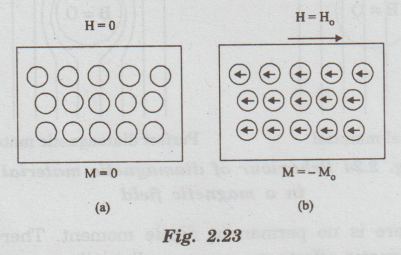Physics for Electrical Engineering: Unit II: b. Magnetic Properties of Materials
Diamagnetic Effect
Magnetic Properties of Materials
As a result, the material becomes magnetised. The direction of the induced dipole moment is opposite to that of externally applied magnetic field.
DIAMAGNETIC
EFFECT
Diamagnetism is exhibited by all
the materials.
The
atoms in diamagnetic materials do not possess permanent magnetic moments.
However,
when the diamagnetic material is placed in an external magnetic field, the
electrons in the atomic orbits tend to counteract the external magnetic field.
Hence, the atoms acquire an induced magnetic moment.
As
a result, the material becomes magnetised. The direction of the induced dipole
moment is opposite to that of externally applied magnetic field.
Due
to this effect, the material is very weakly repelled in magnetic field. This
phenomenon is known as diamagnetism.
We
can understand diamagnetism by the schematic illustration in fig 2.23 (a) and
(b).
When
the magnetic field H is zero, the atoms possess zero magnetic moment (fig 2.23
(a)).
When
a magnetic field H0 is applied in the direction shown (fig 2.23
(b)), the atoms acquire an induced magnetic moment in the direction opposite to
that of the magnetic field.

(a)Diamagnetic material. The atoms
do not possess magnetic moment.
(b)When a magnetic field Ho
is applied, the atoms acquire induced magnetic moment in the direction opposite
to the applied field resulting in negative susceptibility
The
strength of the induced magnetic moment is proportional to the applied field
and hence the magnetisation of the material varies directly with the strength
of the magnetic field.
The
induced dipoles and magnetization vanish as soon as the applied magnetic field
is removed.
The
susceptibility of the diamagnetic material is negative. Due to this, the
material is weakly repelled in the magnetic field.
Diamagnetic materials
The
materials which exhibit diamagnetism are called diamagnetic materials.
Properties
(i)
The diamagnetic materials repel the magnetic lines of force. The behaviour of a
perfect diamagnetic material in the presence of magnetic field is shown in fig.
2.24.

(ii)There
is no permanent dipole moment. Therefore, the magnetic effects are very small
in these materials.
(iii)The
magnetic susceptibility is negative and it does not depend on temperature and
applied magnetic field strength.
Example:
Gold, germanium and silicon.
Physics for Electrical Engineering: Unit II: b. Magnetic Properties of Materials : Tag: : Magnetic Properties of Materials - Diamagnetic Effect
Related Topics
Related Subjects
Physics for Electrical Engineering
PH3202 2nd Semester 2021 Regulation | 2nd Semester EEE Dept 2021 Regulation
